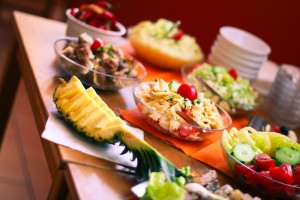I invented a new word today: Nutritionization. It’s what you get when you have an organized pantry and fridge, well-stocked with healthy staples. This may seem like a fantasy, (or just a silly play on words) but with a few tricks to get you started, even the busiest families can have a healthy meal on the table most nights of the week. Meal organizing just got easier!

First, manage that refrigerator:
The only thing worse than that mystery smell is finding out what’s creating it. Do a quick sweep through your fridge each week before you shop. Pitch anything expired or questionable, and ditch leftovers that are more than a few days old. Wipe down the shelves, and move fresh items to the front. Doing this saves time when you unload your groceries. It can also save you a few dollars, so you don’t buy another jar of pickles to replace the ones that were hiding behind last week’s chicken dinner.
Next, pigeonhole your pantry:
Put an end to the madness of those boxes and bags of snacks and staples on your shelves. Storing your food in clear, airtight containers not only extends the shelf life, but also helps you keep inventory of your pantry items. Keeping like items together (canned goods, breakfast foods, baking items, etc.) will help you find things more quickly, and help you keep track of what you need. A dry-erase board hides nicely on the inside of a cupboard door and allows you to keep your grocery list updated.
Plan your weekly meals:
Not only does this make shopping much more efficient, but planning ahead also allows you to prepare what you can the night before. Prep your veggies when you unload your groceries, (or purchase them washed and chopped). Bookmark your meal choices in your cookbooks, or create a weekly bookmark tab on your computer to keep track of what’s cooking this week. There are also many meal-planning apps (too many to list, but I like Cozi) and recipe websites (try allrecipes.com) that allow you to plan and organize your favorites. One last magic trick you must try:
Make friends with your crockpot:
Slow-cookers are not just for pot-lucks. There are many nutritious recipes that can be prepared the night before. All you have to do is plug it in before you go to work, and the magic begins. Add a green salad, and there you have it. Dinner is served. Slow-cooked meals are perfect for evenings when everyone seems to be on different schedules.
Try nutritionizing (you know the verb form of nutritionization), and say good-bye to frozen entrees and boxed dinners. Now even you can answer that burning question, “What’s for dinner?”

